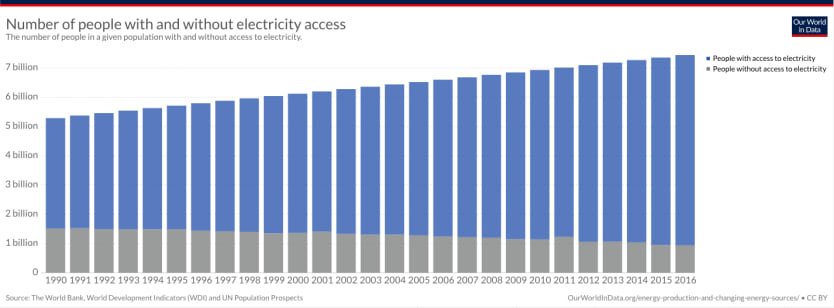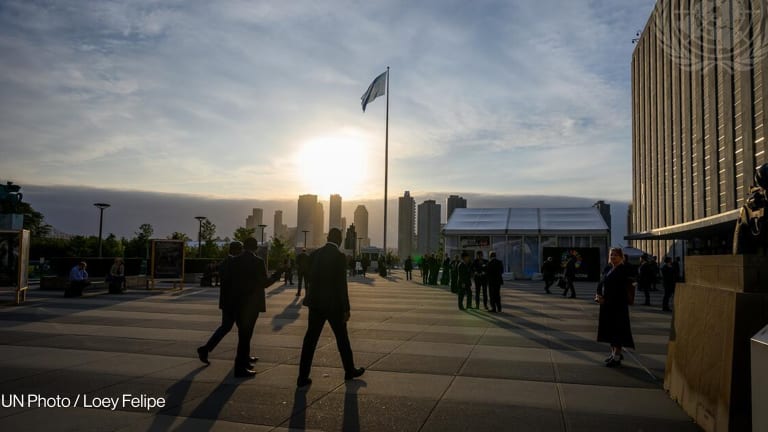
NEW YORK — A new commission convened by the Rockefeller Foundation and a handful of high-powered partners aims to redefine what the world means by “energy poverty” and to push for a more intensive effort to overcome it.
Speaking at the official launch of the Global Commission to End Energy Poverty in New York last week, Rockefeller Foundation President Rajiv Shah called the current metric of energy access contained in the Sustainable Development Goals “minimalist,” and suggested it should better reflect the amount of energy that he said he believes is actually required to drive economic growth.
“You don't often have the chance to change the life trajectory of hundreds of millions of people, and I see that here.”
— Rajiv Shah, president, Rockefeller Foundation“The purpose of the Global Goals is to say, ‘this is our best judgment about the core priorities to extend dignity and inclusion to every human being on the planet,’” Shah told Devex after the event.
He highlighted efforts by African Development Bank President Akinwumi Adesina — who also co-chairs the new commission — to make energy access a top priority for his institution.
Power in Africa
► African Development Bank commits to coal-free financing
► Energy demand must increase in rural Africa to make mini-grids work
“The fact that the goal around energy access is, in my view, defined in such a minimalist manner undermines the efforts that the African Development Bank and others are making to make energy access absolutely central to addressing poverty and building a global economy that's inclusive,” Shah said.
Nearly 1 billion people still lack access to energy, and if current electrification trends continue, that number will still be at 674 million when the SDG timetable ends in 2030, according to the World Bank.
SDG 7, which aims to “ensure access to affordable, reliable, sustainable and modern energy for all,” includes targets around access, renewables, and clean cooking.
Still, as a number of observers have pointed out, the lowest energy access threshold that is used by international bodies including the United Nations and the World Bank currently corresponds to just a few hours of basic energy use per day. In urban areas, the lowest tier of energy access is 500 kilowatt-hours per household — equivalent to five people — per day, and in rural areas, it is only 250 kilowatt-hours per household per day.

Shah, while administrator of the U.S. Agency for International Development helped launch the Obama administration’s Power Africa initiative, pointed to the discrepancy between these goals and the amount of energy consumption that some international bodies regard as enough to lift people out of poverty.
Writing in the Wall Street Journal last week, Ernest Moniz, former U.S. energy secretary, and Alain Ebobissé, CEO of Africa50 Infrastructure Fund, noted that, “the dividing line between developing and developed countries in the U.N.’s Human Development index is 4,000 kilowatt-hours per person per year.”
Based on that observation, they called on environmentalists in Africa and around the world to recognize that, “if the continent’s standard of living is going to improve, it’ll take more than windmills and solar panels,” and they suggested the continent should embrace natural gas.
“I think we should have a redefinition of that goal that is about productive energy consumption,” Shah said, though he suggested that a big investment in research and development of off-grid solar could go a long way in helping to achieve this.
Others, including the Sierra Club, have argued that household energy consumption is the wrong thing to measure, and that by focusing instead on providing people with access to the specific energy services they require, development efforts can help drive lower-cost and more efficient energy solutions that require much less overall power.
Shah’s preference, however, is for big ambitious goals.
“I haven’t seen a theory of economic development grounded in getting everyone to 4,000 [kilowatt-hours per year], and a tiering and vision of what that requires,” Shah said.
“I think we should push ourselves to force that vision as an output of this commission,” he added.
Shah, who has led the Rockefeller Foundation since March 2017, likened the opportunity to two other achievements for which people associated with the foundation were previously awarded Nobel prizes — Max Theiler for the discovery of a vaccine for yellow fever, and Norman Borlaug’s development of hybrid seeds that drove the “green revolution.”
“I feel like this is a challenge, and we can imagine a set of solutions that are at that scale. You don't often have the chance to change the life trajectory of hundreds of millions of people, and I see that here,” Shah told Devex.
“We're going to make a huge investment to work to end energy poverty. We're going to bring together, as you can see, communities of experts and leaders that sometimes agree, sometimes don't agree, and we're going to keep at it for as long as it takes to succeed,” he said.
Update, Oct. 4, 2020: This article has been updated to clarify that the World Bank measures energy access by household.








